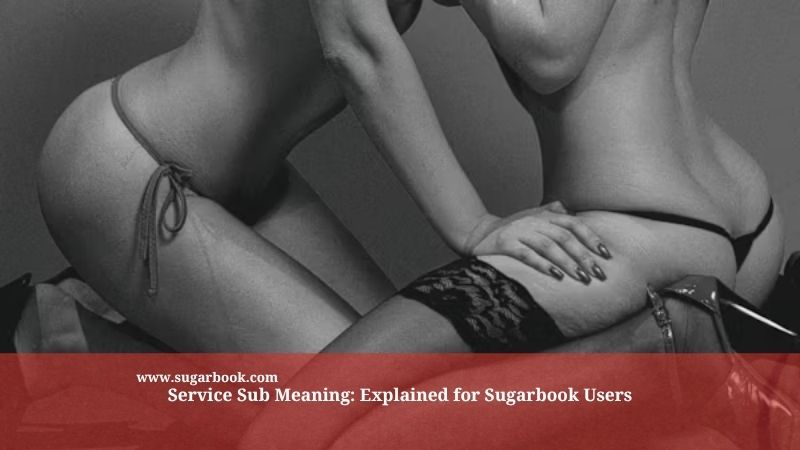
Meet successful sugar daddies and confident sugar babies on the world’s leading sugar dating app. Join free today.
📌 Editor’s Note (Updated for 2025): This article breaks down what “service sub” means on Sugarbook and how to navigate kink-friendly dynamics with care and clarity.
As sugar dating continues to grow into a more inclusive, respectful, and diversified lifestyle, more people are exploring nuanced roles within their relationships. One term that has begun surfacing more frequently in the sugar space is service sub. But what is a service sub, exactly?
For Sugarbook users especially, understanding relationship roles helps form better boundaries, deeper trust, and more empowering partnerships. While sugar babies and service subs may overlap in some emotional qualities, they are distinct roles with separate intentions, expectations, and emotional wiring.
This article will help you understand what is a service sub, how it compares to the sugar baby role, and why clarity in communication is key when exploring these lifestyle dynamics.
Contents
What Is a Service Sub?
Let’s start with the core: what is a service sub?
A service sub—short for service submissive—is someone who finds fulfillment in offering practical, emotional, or domestic service to a dominant partner. Unlike purely submissive roles rooted in kink or sexual expression, a service sub’s focus is often on acts of support, loyalty, and structure.
They may do things like:
-
Perform household tasks or assist with schedules
-
Offer emotional support in structured dynamics
-
Follow specific rituals or obedience-based acts
-
Take pride in servitude—not out of coercion, but choice
This role is not inherently sexual, nor is it financially motivated like many sugar baby arrangements. Instead, it centers on emotional surrender within clear, consensual agreements.
Origins in BDSM and Lifestyle Communities
The term service sub comes from BDSM culture, where dominance and submission roles are clearly defined, usually after intense mutual discussion. However, not every service sub relationship is “kinky.” In fact, many are domestic, emotional, or caregiving in nature.
This is why many Sugarbook users exploring alternative dynamics may ask what is a service sub, especially if they are drawn toward caretaking or structure-based partnerships.
Key Behavioral Traits
A service sub typically embodies:
-
Obedience (within boundaries)
-
Reliability (completing tasks or emotional roles)
-
Satisfaction through giving (emotionally or practically)
-
Loyalty to a dominant partner
Unlike a sugar baby, whose role may focus on companionship or lifestyle goals, a service sub derives joy from supporting and pleasing another person in a structured or ritualistic way.
Difference from Sugar Baby
While some overlap exists in supportive behavior, the sugar baby and service sub identities are fundamentally different.
Material Support vs Emotional Fulfillment
A sugar baby typically enters a relationship seeking mutual benefit, which may include financial support, mentorship, companionship, or lifestyle access.
A service sub is not seeking material compensation. Instead, they are emotionally satisfied through acts of service and personal surrender. Their value is often measured in emotional alignment, loyalty, and role clarity, not monetary exchange.
Emotional Power and Consent
A sugar baby retains full autonomy in a consensual, benefit-driven relationship. They may choose whom to engage with based on generosity, values, or compatibility.
A service sub consciously surrenders a degree of emotional control to a dominant. But this surrender is negotiated, fully consensual, and often structured with safeguards (such as safe words, rituals, and limits).
So, when asking what is a service sub vs sugar baby—it’s about control of emotional power and motivation behind the relationship.
Mutual Agreements vs Power Dynamics
One of the biggest contrasts between sugar babies and service subs lies in how each relationship is structured—through mutual agreements vs power dynamics.
Control, Consent, and Negotiation
A sugar baby might negotiate allowance terms, frequency of dates, and lifestyle expectations. The dynamic is collaborative, focused on freedom and shared experiences.
A service sub enters into a power-based agreement, often outlined in detail—sometimes even in written contracts. Key elements include:
-
Agreed routines
-
Tasks or responsibilities
-
Limits or “hard stops”
-
Defined roles (dom and sub)
These dynamics require enormous trust and maturity. They are not for everyone—but when practiced ethically, they can be fulfilling and deeply intimate.
Role of Sugarbook in Filtering and Education
Sugarbook helps create safer relationship environments by allowing users to specify preferences, roles, and dynamics.
While it primarily supports sugar dating, some users adopt hybrid roles—blending sugar relationships with submissive elements. If you’re exploring or asking what is a service sub in sugar culture, Sugarbook’s private settings, profile fields, and boundary tools help keep every interaction safe, clear, and empowering.
Conclusion: Understanding Roles with Respect
Whether you’re a sugar baby curious about new dynamics or a newcomer exploring identity through relationships, understanding what is a service sub can open up powerful insights into relationship diversity.
The sugar world isn’t one-size-fits-all. With platforms like Sugarbook, you can define your needs—emotional, physical, or practical—with partners who respect your boundaries and lifestyle choices.
Ultimately, whether you’re drawn to luxury, care, structure, or surrender—the key is knowing what role fits you best and communicating it clearly. The future of sugar dating is about freedom, education, and emotional authenticity.
FAQ
Q1: What does “service sub” mean in sugar dating?
A1. A service sub (short for submissive) is someone who enjoys taking care of or serving their partner in respectful, consensual ways.
Q2: Is being a service sub the same as BDSM?
A2. Not always. Some service subs enjoy domestic or emotional service without physical submission or kink.
Q3: Can a sugar baby be a service sub?
A3. Yes – many are. It’s about dynamics and preference, not labels. It works when both parties agree on roles.
Q4: Is “service sub” a red flag on dating apps?
A4. No, but communication is key. Ask what it means to the other person – everyone defines it differently.
Q5: What should I do if I see this in someone’s bio?
A5. Don’t assume. If you’re curious or interested, ask respectfully. If not your thing, move on without judgment.
What Is a Service Sub?
🇲🇾 Curious how dating roles show up in Malaysia? Read our red flag guide →
📱 中文用戶:台灣甜心交友術語 →













